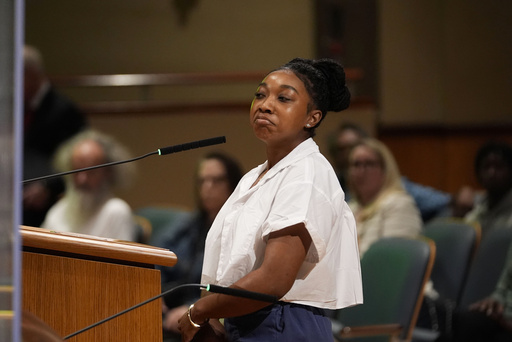
NEW ORLEANS — After relocating to New Orleans and purchasing her first home in 2021, Candice Henderson-Chandler discovered that her new residence had significant ties to the city’s civil rights movement, specifically as the childhood home of the notable activist Oretha Castle Haley. In recognition of this historical legacy, Henderson-Chandler established a nonprofit organization with intentions to transform part of the property into a museum dedicated to celebrating this important history.
She also utilized Airbnb to rent out the property, emphasizing its civil rights heritage, and offered memberships and themed merchandise, such as “Freedom Fighter” citrus candles, on her nonprofit’s website.
However, on Thursday, a majority of the New Orleans City Council voted against Henderson-Chandler’s proposal to alter the zoning regulations to permit the museum. Critics of the plan argued that it represented another instance of external parties attempting to commercialize and exploit the city’s rich Black cultural heritage. A statement from three of Haley’s sons and seven grandchildren accused Henderson-Chandler of taking advantage of their family member’s legacy contrary to their wishes.
Councilmember Jean Paul Morrell, opposing the museum, expressed concern: “In our people and our history, often times all they could leave you was your name — that is the history of Black people in the United States. If all you have is your name, there’s a reason why people in this city care so much about who uses your name and how.”
Oretha Castle Haley co-founded the New Orleans chapter of the Congress of Racial Equality in 1960, a key organization in the Civil Rights Movement. Clyde Robertson, director of the Center for African and African American Studies at Southern University of New Orleans, highlighted her significant role in orchestrating protests and sit-ins aimed at desegregating the city. Haley passed away in 1987, and in her honor, a boulevard in New Orleans bears her name.
The family home located at 917-919 North Tonti Street in Tremé, recognized as one of the nation’s oldest Black neighborhoods, served as a refuge for individuals participating in the 1961 Freedom Rides against public bus segregation. It was officially listed on the National Historic Registry as the “Castle Family Home” in 2023.
Johnny Castle, Haley’s younger brother, shared memories of waking up as a teenager to find numerous civil rights activists staying at their family home. He inherited the property in 1998, yet following unsuccessful negotiations with the City of New Orleans for its preservation, he succumbed to bankruptcy in 2011 and ultimately lost the property.
Years later, he crossed paths with Henderson-Chandler, a Chicago native who had purchased the house. Initially, she aimed to create a wellness center for women of color but soon became captivated by the historical significance of the residence. “Johnny would call me night after night, and I just fell in love with history through his eyes,” she explained.
Castle commented that his relatives exaggerated their sister’s impact on the home’s legacy, asserting that their parents also played a significant role in welcoming activists. He expressed support for Henderson-Chandler’s vision for a museum and community center.
In contrast, Michael Haley, one of Oretha’s sons, recounted how Henderson-Chandler initially communicated her intentions to establish a wellness center, not a museum linked to his mother’s legacy. He learned of her aspirations through social media, prompting backlash from the Haley family.
Subsequently, Michael Haley and other family members filed a lawsuit against Henderson-Chandler under the Allen Toussaint Legacy Act, a Louisiana law that safeguards the commercialization of deceased individuals’ identities without the consent of their heirs. In August 2023, a civil court issued an interim injunction preventing Henderson-Chandler from “representing the legacy of Oretha Castle Haley in any manner whatsoever.”
Henderson-Chandler is contesting the injunction while continuing her plans for a museum that would exclude any direct references to Castle Haley and instead focus on the broader civil rights movement. Her attorney, William Aaron, argued that Haley’s legacy, while significant, does not encompass the entirety of the movement in New Orleans, suggesting that the museum could highlight contributions from numerous other activists without mentioning her.
Haley’s descendants strongly refuted the notion that the property’s significance could be separated from Haley. “How are you going to do that? She lived there!” exclaimed Okyeame Haley during the council meeting. Another son, Sundiata Haley, insisted that any efforts made at the residence would intrinsically represent Oretha Castle Haley’s legacy.
Haley’s granddaughter, Simone Haley, expressed concerns, believing that the museum’s motivations were financially driven, and her family did not wish to commercialize this legacy. She appealed directly to Henderson-Chandler at the council meeting, emphasizing the importance of honoring their stories correctly.
Supporters of the museum pointed out the dilapidated condition of the property, questioning why it had been allowed to deteriorate if it held such historical importance. Michael Haley responded that their family hadn’t owned it for decades and dismissed the irrelevance of the property to the proposed museum. Proponents argued that blocking the museum would deny future generations the opportunity to learn about the city’s history.
Henderson-Chandler asserted that she had engaged with other community members and received the support of civil rights movement veterans. However, Councilmember Morrell indicated that relatives of other prominent deceased civil rights figures also expressed that they were unaware of plans to include their legacies in the museum, highlighting the need for family dialogue when telling someone’s story.
Haley’s grandson, Blair Dottin-Haley, conveyed that the City Council’s decision to reject the museum aligned with what “our ancestors would want us to do.” He stated, “We will always stand and fight against those who would take our culture and misappropriate and mishandle it and mismanage it.”
